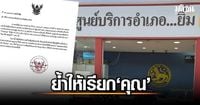On May 10, 2025, the Department of Local Administration in Thailand issued a directive emphasizing the importance of using respectful language when addressing citizens at public service centers. This decision comes after complaints were raised about staff referring to service users as "Uncle" and "Auntie," which many found inappropriate.
The directive, outlined in a letter from the Department of Local Administration (DLA) dated May 7, 2025, was a response to feedback received through the Office of the Prime Minister. Citizens expressed their discomfort with the informal terms used by staff at service counters, particularly those located in shopping malls. The letter recommended that officials address customers using the more formal titles "Khun" (Mr./Ms.) followed by their name, instead of the casual terms that had previously been in use.
N.S. Tairashuli Tairasranakul, Secretary of the Minister of Interior, clarified the situation during a press briefing on May 9, 2025. She explained that the directive stemmed from public suggestions about the need for more appropriate language in service interactions. Tairashuli stated, "The use of terms like Uncle and Auntie was deemed unsuitable, and the public recommended that we adopt a more respectful approach by using 'Khun' or 'Khunlukka' instead."
She emphasized that this is not a blanket mandate requiring all staff to use the new titles at all times, but rather a guideline aimed at fostering a more respectful environment. Staff still have the discretion to use their judgment based on the context and the relationship they have with the service users.
In the letter, the DLA requested that public servants maintain a high standard of politeness in both their demeanor and language, adhering to universal communication principles. The goal is to ensure that all citizens feel valued and respected when accessing public services.
Despite the intention behind the directive, some have raised concerns about the necessity of changing language practices. Critics argue that traditional terms like "Uncle" and "Auntie" are culturally significant and reflect a familial warmth that many citizens appreciate. An unnamed former official expressed confusion over the need for such a change, questioning why the terms should be abandoned altogether.
As the conversation around this directive continues, the DLA is also working on issuing a clearer communication to the public to prevent misunderstandings. Tairashuli mentioned that the previous letter may not have been sufficiently clear, leading to confusion among readers. She assured that a new letter would be released soon to clarify the department's stance.
Additionally, the Smapan Association of Thailand has voiced its support for the DLA's efforts to enhance public service delivery. They have encouraged the establishment of more service centers to facilitate better access for citizens, particularly in areas with high demand for public services.
The DLA's initiative to refine communication practices highlights a growing awareness of the importance of language in public service. As more citizens engage with government services, the need for respectful and appropriate communication becomes increasingly crucial.
As Thailand navigates these changes, it remains to be seen how the public will respond to the new guidelines. Will the shift to more formal titles improve the experience for service users, or will it create a disconnect from the traditional, more personal approach?
In any case, the DLA's directive marks a significant step towards modernizing public service interactions in Thailand, aiming to create an environment where every citizen feels respected and valued.




